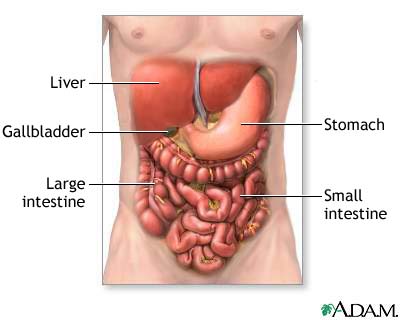Treatment
When a person is bleeding from the colon, it is important to determine the source of the bleeding and how fast they are losing blood. The patient’s condition must be evaluated continuously and may need to be admitted to a hospital’s intensive care unit (ICU). Fluids may be given through a vein, and blood products may be required.

Treatment begins once the source of bleeding is found. Most patients stop bleeding on their own without any treatment.
If treatment is needed, it may involve:
* Angiography to help form a clot in the bleeding area or to deliver medicine to help cause the blood vessels to tighten to stop the bleeding
* Burning (cauterizing) the site of the bleed with heat or a laser using a colonoscope
* Using electrical energy (argon plasma coagulation) to stop bleeding
In some instances, surgery is the only option. Removal of the entire right side of the colon (right hemicolectomy) is the treatment of choice for someone with this condition who continues to bleed at a dangerously quick rate, despite several treatments by angiography and colonoscopy.
Prognosis (Expectations)
Patients who have bleeding related to this condition despite having had colonoscopy, angiography, or surgery are likely to have more bleeding in the future.
The goal of therapy is to reduce, if not totally eliminate, the number of bleeds, hospitalizations, and blood transfusions. Surgery may be a cure in some cases. The outlook remains good if the bleeding is controlled.
Complications
* Anemia
* Death from excessive blood loss
* Side effects from treatment
* Severe loss of blood from the GI tract
Calling Your Health Care Provider
Call your health provider if rectal bleeding or black stools occur.
Angiodysplasia of the colon: Overview, Causes
Angiodysplasia of the colon: Symptoms & Signs, Diagnosis & Tests
Angiodysplasia of the colon: Treatment
Reviewed By : Linda Vorvick, MD, Seattle Site Coordinator, Lecturer, Pathophysiology, MEDEX Northwest Division of Physician Assistant Studies, University of Washington School of Medicine. Also reviewed by David Zieve, MD, MHA, Medical Director, A.D.A.M., Inc.
